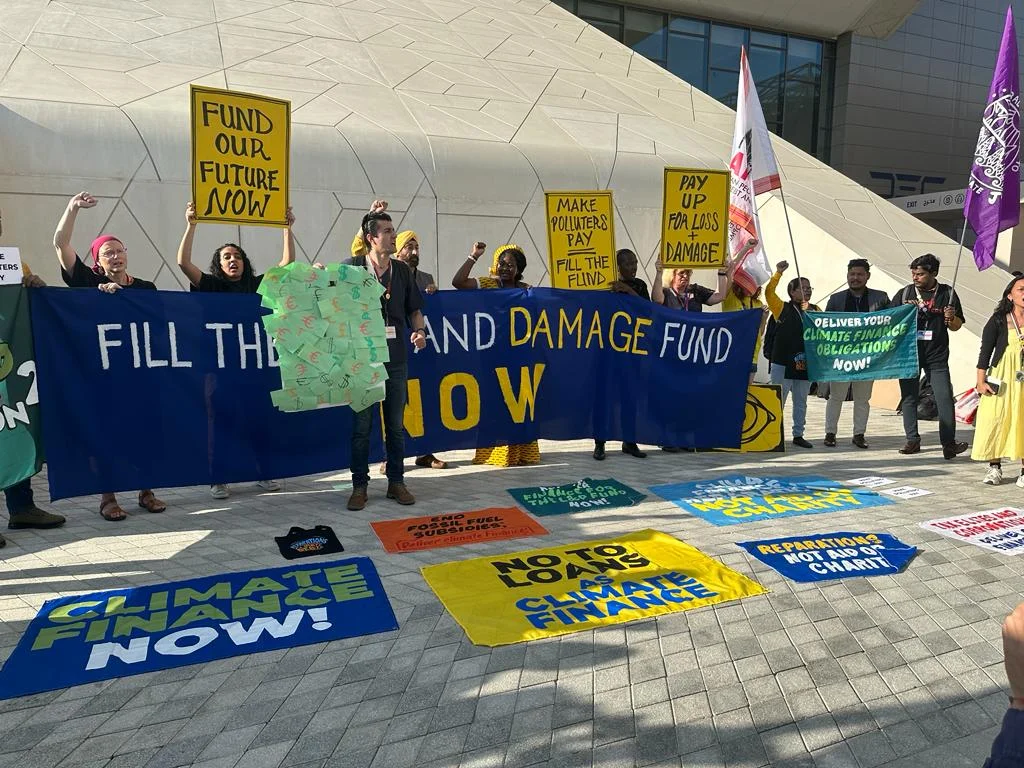Amid recent revelations regarding the COP28 Presidency, leaks on fossil fuel deals and meagre climate finance pledges, climate activists assembled at COP28 this morning, with a clear message: the funding of fossil fuels needs to end.
The activists who called for climate justice underlined the devastation and destruction that the continued fossil fuel financing is having on communities across the world.
One activist from Pakistan discussed the extreme 50-degree weather that the country has been subjected to, and said that if MDBs do not stop funding fossil fuel, this will be the norm, “not just here, not just in Pakistan, all over the world.”
Those who gathered also called out the lack of financial commitment made to the loss and damage fund, which was hailed on the first day of COP28 a “breakthrough deal.”
Speaking about this to ESG Mena, Lidy Nacpil, Coordinator, Asian Peoples’ Movement on Debt and Development (APMDD), a regional alliance of peoples’ movements, community organisations, coalitions, NGOs and networks, said: “We’re here to deliver the message about climate finance delivery. Our specific focus at the moment is what they’re committing for the loss and damage fund because it is in very, very small amounts, and it’s really outrageous.”
“We want to strengthen this message about filling the fund because it’s useless to have a fund when there is no proper pledging and commitment to fill it with the adequate amounts that are needed.”
This was echoed by Zaghum Abbas, from APMDD: “I come from Pakistan, a country which is at the breaking point when it comes to climate. We had devastating floods last year, ten million people are out of their homes.”
“This is not just the story of Pakistan,” said Abbas, “it is the story of all the least developed countries, the countries which are on the verge of climate breakdown, because of the exploitation of the Global North.”
“We believe that it is the historical, moral responsibility of these developed countries to give us adequate non-debt creating climate finance so that our countries can cope with the adaptation and mitigation of the actions that they have taken.”
Calling for the end of what she called “false solutions,” Krishna Ariola, from Youth for Climate Hope, said: “A recently released report from Climate Analytics, a Berlin-based Science Institute, discussed how our Philippine power sector can align to the 1.5 climate target. That transition is heavily dependent on climate finance, and yet, we see our governments and governmental agencies are using that money to funnel it to gas, CCUs, hydrogen, ammonia co-firing and trying to brand that as clean energy while having our communities as collateral damage.”
Adding: “I am here bringing the realities of one of the most climate vulnerable countries, the Philippines is experiencing 20 typhoons a year and having been victim of these typhoons myself, I’m bringing these realities here and really looking forward to organising with other sectors and building pressure to stop public fossil fuel finance.
These demonstrations come against a backdrop of the swirling controversy following the circulation of HE Dr Sultan Ahmed Al Jaber’s pre-COP comments on reaching the 1.5 degree ‘north star,’ a revelation which some say has undermined this year’s COP.
Bill Hare, the chief executive of Climate Analytics, for example, told The Guardian: “Sending us back to caves’ is the oldest of fossil fuel industry tropes: it’s verging on climate denial.”
Today, speaking on the comments that came to light yesterday, Ambassador Majid Al Suwaidi, COP28 Director General, said: “There are those out there who are consistently trying to undermine our presidency from day one,” and argued that media is paying too much attention to the revelation: “There are many things that are happening here at COP that you are not reporting about – you’re focussing on this one thing.”
Further, he claimed that Dr Al Jaber has been “very clear that he believes in the science.”
The debate on fossil fuel phase-out is ongoing, despite over one hundred countries supporting the call.
Last week, the 27 Member States of the European Union and the 79 Members of the Organisation of African, Caribbean and Pacific States (OACPS) said: “The shift towards a climate neutral economy, in line with the 1.5ºC goal, will require the global phase-out of unabated fossil fuels and a peak in their consumption already in this decade.”
They also called on global action towards the tripling of installed renewable energy capacity to 11 TW and doubling of the rate of energy efficiency improvements by 2030.



